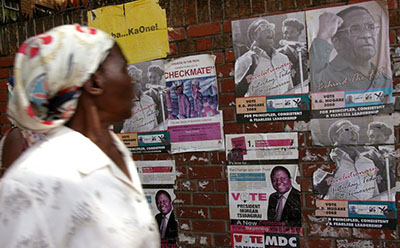Cape Town, South Africa, June 18, 2013–All parties in Zimbabwe’s government of national unity must respect the responsibility of journalists to document events and report the views of citizens, especially in the run-up to the country’s elections in July, the Committee to Protect Journalists said today. In four different cases this month, reporters have been attacked apparently in connection with their coverage of the country’s two major political parties.
“The new constitution, which was supported by an overwhelming majority of voters in March, guarantees freedom of expression. We urge the leaders of all political parties to insist on discipline and restraint from their members and to stop targeting journalists,” said CPJ’s Africa Program Coordinator Sue Valentine. “Zimbabweans have a right to receive information about the political, social, and economic conditions in which they live, and to make informed decisions about who their next government should be.”
On June 14, three masked assailants briefly abducted freelance journalist Paul Pindani from his home in Chinhoyi in north central Mashonaland West province and beat him, news reports said. James Muonwa, the Mashonaland West correspondent for NewsDay and the vice president of the local chapter of the Zimbabwean Union of Journalists, told CPJ the journalist had been hospitalized with injuries that included a broken arm and bruises.
Muonwa told CPJ that Pindani had been attacked in connection with an unbylined June 11 story in NewsDay that said an alleged member of the ruling ZANU-PF party had been arrested on charges of fatally assaulting a local businessman. Muonwa told CPJ that the attackers had assumed Pindani was the author as he was the most widely known journalist living in Chinhoyi, but that Pindani was not the author of the report. Muonwa said that the day before the attack, Pindani had told him he had been threatened in connection with the story. Police were investigating the attack, but had not made any arrests, he said.
The upcoming elections will end the power-sharing agreement between President Robert Mugabe’s Zimbabwe African National Union Patriotic Front (ZANU-PF) and Prime Minister Morgan Tsvangirai’s faction of the Movement for Democratic Change (MDC-T). Elections under Zimbabwe’s new constitution are scheduled for July 31, but the date is being challenged by opposition parties who want the vote to take place at least a month later.
The attack on Pindani follows three other assaults on journalists this past month, all allegedly perpetrated by security officers or supporters of the Tsvangirai-led faction of the MDC. On June 6, Mashudu Netsianda, reporter for the state-owned Chronicle, was detained briefly while covering a meeting between Tsvangirai and businessmen in Bulawayo, news reports said. His notebook was confiscated and his recordings were deleted, the reports said. The following day, Zimbabwe Independent journalist Herbert Moyo was assaulted as he tried to report on MDC members protesting against the choice of candidate for their constituency. On June 8, Bernard Mapwanyire, a reporter for the private Masvingo Mirror, said he had been roughed up while covering MDC-T primary elections, the reports said.
Nelson Chamisa, organizing secretary of the MDC-T, told SW Radio Africa that his party has been a victim of violence and said the attacks were abominable and unacceptable. Chamisa said they were investigating the attacks, which could have been the work of “infiltrators” attempting to portray the faction as violent.
Dumisani Muleya, editor of the Zimbabwe Independent, told CPJ that the recent spate of assaults was a sign of growing hostility among MDC officials toward public criticism about how it had performed in the government. “They’re not used to such criticism,” he said. “The actions of the youths [assaulting people] is a result of the pronounced and unpronounced anger and sensitivity,” he said.
- For more information about Zimbabwe, please see CPJ’s Zimbabwe page.
